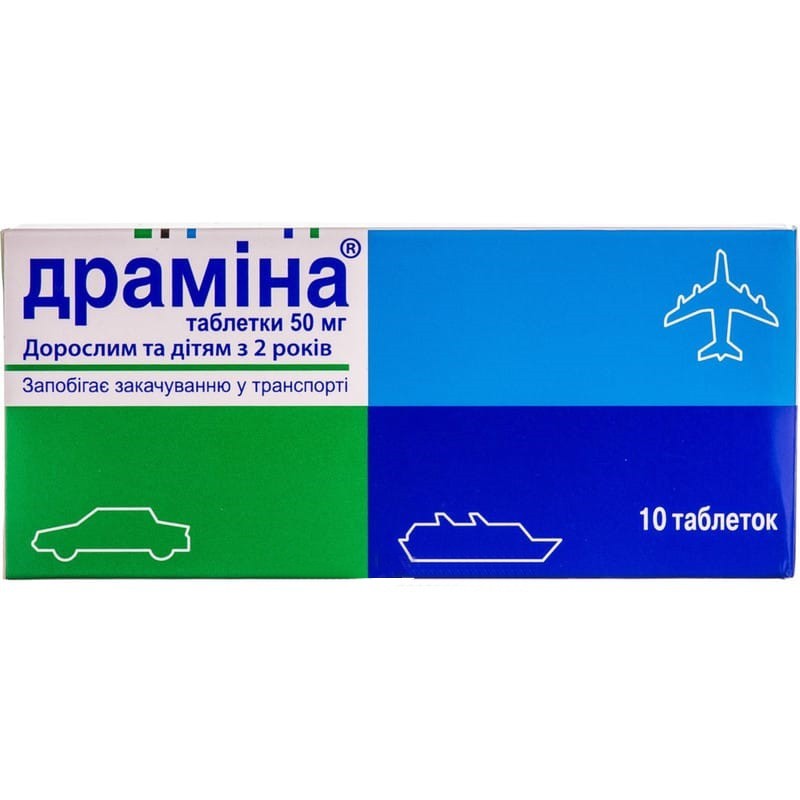



 Secure and encrypted payment processing
Secure and encrypted payment processing We ship to over 40 countries including the USA, UK, Europe, Australia and Japan
We ship to over 40 countries including the USA, UK, Europe, Australia and Japan Guaranteed refund or reship if you haven't received your order
Guaranteed refund or reship if you haven't received your orderThe active substance of the drug dramine - dimenhydrinate - refers to derivatives of ethanolamine. dimenhydrinate is a blocker of h1 receptors, has an antiemetic, sedative, anti-muscarinic, antihistamine effect. reduces the excitability of the central nervous system vomiting center.
After oral administration, dimenhydrinate is rapidly absorbed. Cmax in blood plasma is achieved 15-30 minutes after administration and persists for 4-6 hours.
About 98–99% of dimenhydrinate binds to plasma proteins. Dimenhydrinate passes through the placental barrier and passes into breast milk.
Dimenhydrinate metabolism is carried out mainly in the liver. It is excreted from the body within 24 hours, mainly in the form of metabolites, in a smaller amount - unchanged by the kidneys. T½ from blood plasma - about 5-10 hours
Prevention and elimination of nausea and vomiting due to manifestations of seasickness and airborne disease, with the use of radiation therapy, drugs and after surgery
Adults and children over the age of 12 years: 50 mg (1 tablet) 30-60 minutes before the trip, then 50-100 mg every 4-6 hours as needed, but not more than 400 mg / day.
Children aged 6–12 years: 25–50 mg (½ – 1 tablet) every 6–8 hours if necessary, but not more than 150 mg / day.
Children aged 2–6 years: 25 mg (½ tablets) every 6–8 hours if necessary, but not more than 75 mg / day.
With Menieres disease and other disorders of the vestibular apparatus
Adults: 50-100 mg (1-2 tablets) every 4-6 hours, if necessary, not exceeding the maximum daily dose of 400 mg (8 tablets).
Elderly patients should use an initial dose of 25 mg (½ tablet).
With liver failure, the dose should be reduced by 2 times.
In renal failure, use in the usual dose.
Hypersensitivity to dimenhydrinate, diphenhydramine, as well as to other antihistamines of a similar structure, hypersensitivity to other components of the drug. eclampsia, epilepsy (especially in children), severe renal failure, severe liver failure, acute asthma, pheochromocytoma, porphyria, prostate hyperplasia with urinary retention, angle-closure glaucoma, increased intracranial pressure. During pregnancy and breastfeeding. children under 2 years old.
From the side of the nervous system: dizziness, headache, drowsiness, agitation, insomnia, depression, fatigue, increased reaction time, muscle weakness, impaired coordination of movements, tremor.
From the side of the organ of vision: blurred vision, diplopia are possible.
From the side of the organ of hearing and the vestibular apparatus: tinnitus.
From the cardiovascular system: tachycardia, arrhythmia, angina pectoris, arterial hypotension.
From the digestive system: stomach pain, diarrhea or constipation, dry mouth, nausea, vomiting, increased appetite, weight gain.
On the part of the skin and subcutaneous tissue: hypersensitivity to light, rash, urticaria.
From the immune system: angioedema.
From the urinary system: difficulty urinating.
Others: arthralgia, decreased sweating, dry mucous membranes.
Use with caution in patients with renal and / or liver failure.
Use during pregnancy or lactation. During pregnancy, the drug is contraindicated.Dimenhydrinate passes into breast milk in a small amount, so breast-feeding should be discontinued during treatment.
The ability to influence the reaction rate when driving vehicles or working with other mechanisms. Taking the drug can cause drowsiness, impaired coordination of movements, dizziness, an increase in reaction time, so when using dimenhydrinate, you should refrain from driving vehicles or working with mechanisms with an increased risk of injury.
Children. The safety and effectiveness of the drug in children under 2 years of age have not been established, therefore, children of this age category are not prescribed the drug.
Dimenhydrinate can enhance the inhibitory effect on the central nervous system of drugs such as sleeping pills, sedatives, tranquilizers, antidepressants, antipsychotic (antipsychotics), antiepileptic, and also alcoholic beverages. the drug may enhance the anticholinergic effect of other drugs. the drug may mask the side effects of ototoxic drugs (e.g. aminoglycosides).
Symptoms: dry mouth, nose, throat, flushing and redness of the face, difficulty breathing, rashes on the skin; arrhythmia, tachycardia, a sharp decrease in hell with a possible loss of consciousness; drowsiness, depression of central nervous system or agitation with hallucinations, convulsions.
Rarely possible visual impairment, tinnitus; difficulty urinating stomach pain, increased or decreased appetite.
Treatment: there is no specific antidote. Symptomatic therapy is aimed at eliminating the clinical manifestations of an overdose: gastric lavage, administration of enterosorbents and drugs aimed at increasing blood pressure, infusion therapy, etc.
At a temperature not exceeding 25 ° c.